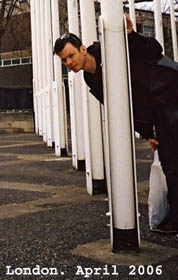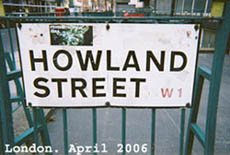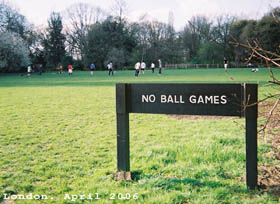The Closing of the Western Mind
 Splat! What’s that noise? Splat! There it is again – do you hear it? It’s getting closer – Splat – splat! Yeah, that… no it’s not the petrol gauge on your car. SPLAT! Hrmmm… I think it’s the distinct sound of stock-markets crashing around the world – splat. We better get ready for a global pity-party, not unlike the one taking place in Ken Lay’s billion-dollar booze cabana right about now. I bet a lot of Wall Street wallflowers are wishing they hadn’t set such a hot fire for Martha-the-bad-bitch. Second-home investors in Dubai must be shaking in their sandals. The carpetbaggers who’ve seized New Orleans must be pretty worried at the moment. Pity. Excuse me for a moment while I emit a belly-laugh which causes me to choke on my own saliva. Who says that ghetto culture and corporate culture have nothing in common? ‘The roof, the roof, the roof is on fi-re! We don’t need no water let the mother f***er burn… burn mother f***er BURN!’
Splat! What’s that noise? Splat! There it is again – do you hear it? It’s getting closer – Splat – splat! Yeah, that… no it’s not the petrol gauge on your car. SPLAT! Hrmmm… I think it’s the distinct sound of stock-markets crashing around the world – splat. We better get ready for a global pity-party, not unlike the one taking place in Ken Lay’s billion-dollar booze cabana right about now. I bet a lot of Wall Street wallflowers are wishing they hadn’t set such a hot fire for Martha-the-bad-bitch. Second-home investors in Dubai must be shaking in their sandals. The carpetbaggers who’ve seized New Orleans must be pretty worried at the moment. Pity. Excuse me for a moment while I emit a belly-laugh which causes me to choke on my own saliva. Who says that ghetto culture and corporate culture have nothing in common? ‘The roof, the roof, the roof is on fi-re! We don’t need no water let the mother f***er burn… burn mother f***er BURN!’
Oh, bother. I am only into my second paragraph of this little ditty of an essay and I realize I already owe somebody an apology: did I use the ‘C’ word in the same sentence as the word ‘market’? To the ardent believers, crash is to market as oil prices are to SUV owners as logic is to fundamentalism. Hallowed be thy terms. Of course, no one wants to use the word ‘crash.’ Instead, this market phenomenon – where the value of the ink on a given stock certificate begins to supersede the value of the words the ink was used to imprint – has become known as a ‘correction.’
The confusion over terminology is not unlike the recent focus of the so-called news media. Mad King George and troubled Queen Blair are obsessed with going to great lengths not to call the civil war in Iraq a civil war in Iraq. ‘Mistakes were made.’ What a dog-and-pony show they were putting on in Washington last week. ‘With us or against us’ has become ‘Can I buy you dinner?’ At least a British news reporter was able to use the press conference fiasco to alert Queen Tony that his days were numbered. (He looked surprised, and didn’t take the news very well).
Now that American and British defence contracts, building contracts, oil interests and land-grabbers are all in place in Iraq, Bush – now undeniably the most unpopular president in American history – and Blair – the lamest duck in the henhouse – want to talk about their blunders, miscalculations and pulling out of their illegal occupation of Iraq. They want a kinder, gentler bloodbath.
The only thing strategic about the illegal occupation of Iraq and the murder of thousands of innocent people (troops included) has been the way the Bushblair machine has spun its lies to the public, and how irresponsibly the American news media has handled it. All this brings to mind another ‘C’ but I can’t use it. If I had half a chance, like a well-informed liberal for the next election that’s not Hillary Clinton, I would use it extensively. But I don’t much think it will work. Gore Vidal pointed out in a speech I attended in New York just after Nine-Eleven, that we can no longer use the word ‘conspiracy’ to describe things like King George’s electoral theft of the throne, the plane that never hit the Pentagon, the Blair-Bush connection, the Katrina land-grab, etc. Instead, Mr Vidal suggests we must now use the word ‘coincidence’. I’m with him on this one – the same writer who predicted around the same time ‘George W. Bush will leave office the most hated one-term President in American history’. Mr Vidal, can I buy you dinner?
Since King George was never elected the first time, and only arguably the second, and his approval ratings are now lower than any sitting president in history
… coincidence? I think I might like this coincidence business because it adds the implication that explanations are in order – ‘’bout time we had some ‘splainin’ around here!’
Closer to us little people, the latest coincidence that’s gotten my southern dander up is the shameful situation going on in British higher education – unfortunately Brits seem hell-bent on following their American counterparts on the downward spiral to academic destruction – splat. If you haven’t heard, there’s a pay dispute between teachers and universities, and as a result, the teachers are holding examinations, grades and degrees hostage nationwide. Students have been swept to the wayside, while their trusted universities and faculties fight it out. Nice one, just in time for graduation – coincidence? If this type of thing hasn’t happened to you, you probably know someone who’s had at least one unplanned detour from their educational path. In my own academic travels, I’ve seen successful teachers without PhDs sacked for not having a PhD (by Chancellors without PhDs); and students on both sides of the Atlantic ignored by their university administrations like second class bimbos on Valentines Day – Splat.
 Bless These Sacred Halls…
Bless These Sacred Halls…
Higher education requires all students to undergo a metamorphosis of certain vulnerability, in order to absorb the coursework – today, the modern university complex exploits this vulnerability at many levels. Students in institutions throughout the West have become units – whores for the body-farm of academia. The current student hostage situation in Britain demonstrates this.
 Who loses? As Allan Bloom pointed out in The Closing of the American Mind, liberal education is dead. The universities can’t profit from it and potential employers don’t need people to think for themselves – they need people who pick tidy little categories in which to spend their lives. Therefore, if liberal education is no longer with us, neither are the broad sensibilities that inform society. Bloom also argues that ‘the most successful tyranny … is the one that removes the awareness of other possibilities.’
Who loses? As Allan Bloom pointed out in The Closing of the American Mind, liberal education is dead. The universities can’t profit from it and potential employers don’t need people to think for themselves – they need people who pick tidy little categories in which to spend their lives. Therefore, if liberal education is no longer with us, neither are the broad sensibilities that inform society. Bloom also argues that ‘the most successful tyranny … is the one that removes the awareness of other possibilities.’
Possibilties? Hrmmm. Like things other than senseless wars, unmitigated capitalism and corruption beyond the wildest estimations? Bloom was correct. King George demonstrates his call for social singularities all too well, with Hitlerian skill: ‘with us or against us,’ ‘evil do-ers,’ or his derelict pronunciation of the word ‘nuclear’ – a calculated appeal to primetime sensibilities. To say that the average Brit, American or Canadian is ‘ignorant’ is no longer true. He, she, they have been narrowed. To say that all-they-know is all-they-know might be heading in the right direction. The void that has been created by the narrowing of our consciousness is identifiable, just as in, say, pre-war Germany, fundamentalist-Christian America or extremist Islam, and is the incubator of nationalism and fascism. Let’s put the flag on the car and sing a hymn! The difference between an ignorant void and an educated void is that with the latter, you get people with MBAs and PhDs believing that the world isn’t really that old and that God put dinosaurs in the ground so that we can have oil. Praise be! – splat.
Who’s to blame? Well, everyone take a dull breath, because the answer is: nobody. That’s the kick in the rubber parts. It’s a broad problem requiring a liberal understanding, and at present, we aren’t offering liberal education. Chicken-egg-chicken-egg. Bock-bock. Bock. The sad thing is, the answers are out there. Some have been for a long, long time.
 Today, like their corporate counterparts, academic institutions have become faceless beasts. If anyone needs a map of the folly of academia they can delve into the aforementioned Mr Bloom, or even a little further to the work of Ms Virginia Woolf. Somewhere along the way, we forgot that her essay Three Guineas is not only an intensive academic study and work of literature – it’s also a prophecy for the mess we’re in right now. But no one listens – they circle their wagons, lose term papers and go on strike for money. Instead of changing the institutions of educated men, as Woolf suggests, we endeavour to force an evolutionary society through the holes of the institutional cheese grater. The result is a society layered like a thick, burnt lasagne, with creaky non-discrimination policies that are impossible to apply or enforce, topped with a dusting of political correctness.
Today, like their corporate counterparts, academic institutions have become faceless beasts. If anyone needs a map of the folly of academia they can delve into the aforementioned Mr Bloom, or even a little further to the work of Ms Virginia Woolf. Somewhere along the way, we forgot that her essay Three Guineas is not only an intensive academic study and work of literature – it’s also a prophecy for the mess we’re in right now. But no one listens – they circle their wagons, lose term papers and go on strike for money. Instead of changing the institutions of educated men, as Woolf suggests, we endeavour to force an evolutionary society through the holes of the institutional cheese grater. The result is a society layered like a thick, burnt lasagne, with creaky non-discrimination policies that are impossible to apply or enforce, topped with a dusting of political correctness.
I think it must have been – in the latter part of the 20th century – that while shifting our entire Western collective of academia from a broad system for training students to a system of theory and pigeon-holing, the smarty-pants people running education took away the little coloured blocks from the kindergartens and preschools. Forget puzzles and crayons – kids need blocks. Red ones, blue ones, green ones and yellow. Bring them back! Without blocks it’s clear that Hobbes, Locke and most modern people don’t grow up with the comprehensive understanding that round pegs don’t usually fit snugly into square holes – splat.
 Gods and Ipods.
Gods and Ipods.
Aside from all the high-brow stuff, ask any student how their education is going and they’ll tell you: School Sucks! And you know what? They’re absolutely right. It sucks bigtime. Oh, pardon me, don’t get offended by the language… what do you expect from a society that procedurally narrows its students? (See: Bush, derelict, nuclear, above.) School, university, graduate school does suck. It should suck. The problem is, it doesn’t suck for the right reasons.
Learning should suck because growth hurts. Growing pains. Duh. But again, to paraphrase Mr Bloom, instead of having growth centred around challenges, we have pains centred around institutions. He advocates more ‘literacy-literacy’ rather than computer literacy. Even as Mr Paul Mackney, former leader of the NATFHE lecturers’ union here in Britain, points out – in a in a recent article in the Guardian – a policy of ‘pile ‘em deep, teach them cheap’ has pervaded since 1992 and the layoff of 22,000 lecturers in the UK. So is it not a bona-fide coincidence that education, at any level, does in fact suck?
But before we get too far down a path and get academic sucking confused with post-adolescent melancholy, let’s leave the pitiful colleges and universities to rest for a minute. Students need a bit of this non-blame as well. I teach on a regular basis, and am confronted with the same problems as colleagues across the profession – which I see in three distinct forms. First, there is the student who has been so processed and narrowed by our current educational system they find it stunning to discover (if they are so lucky) that their identities are broader than the columns in their course outlines – writers can do maths, nurses can write poems, musicians can play sports, too. A bit clichéd at first, however, my experience time and time again has been that a fair majority of the people coming into my classrooms are truly unaware of how comprehensive their lives could be. My job is to get them to write, hopefully something original, without consideration of career, cause or who’s going to read it. What? An examined life?
The second instance inhibiting students is pop culture. I have no fuss with pop culture per se. My scorn there lies with the industry that makes it and shoves it down our throats – alongside a news media that reports it as the defining force behind society. By the time students get to a class, they have already seen hundreds of thousands of adverts and it’s no wonder that at any age they have trouble concentrating. Sure Apple, in my opinion the most corrupt company in the computer industry, is thrilled to get their Ipods onto the heads of everyone in the free world – not only are we less aware of the world, the culture industry has an uninhibited link to our brains. To use one last Bloom quote: ‘…as long as they have their Walkman on, they cannot hear what the great tradition has to say. And, after its prolonged use, when they take it off, they find they are deaf.’ Tommy, can you hear me?
The third kind of situation in my classrooms is a rancid combination of situations one and two – by far the worst: an inhibited or nonexistent sense of self, replaced by an uninterrupted infusion of pop culture. They can tell you how Kylie is doing with her breast cancer or what the dismal people on Big Brother had for breakfast – but not what they ate or would have liked to have eaten at 8am. Have you ever wondered why a large portion of young people are ‘Hoody’ kids, Goths or the like? Would they work so hard to hide their faces if they felt they were a tangible part of their society? We leave them in their rooms, whether at home or in dismal university dormitories, locked away, with TV, computers and Ipods, and wonder why they don’t assimilate. Where’s the bloody question?
 3 Ways to Fix Everything. Almost.
3 Ways to Fix Everything. Almost.
So what’s the answer? Well, first, having used Bloom et al for an article/essay, I fully realize I’ve opened a potential debate on what liberal education should be. However, I reserve my right to declare that fight open on another day. But I’m prepared – if you rabid creationists see fit, go ahead, send the email. Yawn.
Otherwise I am inspired on a few other, different levels. A ground-up approach which might work, being that no one knows how to look at their own feet anymore. This coupled with my Mother’s insistence that I write about something nice, has given me some fresh perspectives to take on the powers-that-be. You know the powers: the bureaucrats that hide on Capitol Hill or behind Big Ben. The faces behind the faceless corporations and institutions of higher learning – the ones who are hurrying along plans for national ID cards in Britain and immigration reform in the US. Powers that are fighting to make the world safe for oil production and siphoning off the last remnants of western manufacturing to Communist China. Powers that are threatened by the notions of self-empowerment or original thought. The propagandists who believe culture starts in a boardroom and that unmitigated capitalism will instigate the second coming of Christ. Yes – them.
Shall we? Let’s! I’ve endeavoured to begin a list of suggestions that, like Falun-Gong to the communist regimes in China, will positively scare the pants off the purveyors of modern politics, the culture industry and fundamentalist fear-mongers. Stop the madness: just say BOO!
1. Go to your local school authority and start an activist movement to reinstate a comprehensive, gender-blind Home Economics course in school. At all levels.
I think it’s just precious that a large part of the public education debate in the US has been spent on the ‘creationism vs. evolution’ subject – certainly time well spent. In the UK, studies are starting to support the notion that if you overwork Arthur and Virginia at school, they tend to burn out. More time, well, just spent. Is it any wonder that the majority of young people can argue about Darwin and do calculus but can’t balance a chequebook or cook an egg? Fold their laundry? Grow a houseplant? Are we surprised that a large number of people in the two richest countries in the world live in squalor?
We allow McDonalds, Virgin Records and Nintendo to do the job of filling the gaps between young people and their sense of purpose in society, then become outraged when they turn into yobs, punks, gangsters, neds and useless couch potatoes. Or better yet - depressed addicts of various sorts. Fill ‘em full of sugar, let God sort ‘em out!
My layman’s theory: if we reinvigorate courses and teach young people to cook for themselves, clean for themselves, think for themselves and take pride in themselves -they might tend to cook, clean, think and take pride. Maybe some would use these skills in other areas of life. Quite possibly, a few might be less dependent on MTV for their sense of purpose in life. Go figure. But I guess we might need a study on the subject before making any rash moves.
2. Carry a small pair of wire cutters in your pocket, purse or rucksack. When, in your travels, you encounter a television located in a child’s bedroom, unplug it and irreparably cut the power cord.
Are details really necessary? Don’t get caught.
3. Go to a place of great pain and suffering. Sit there. Listen. See what happens. Most of us get our pain from television – how about some reality-based agony?
Suggestions: Rwanda; Lhasa; the Anne Frank House in Amsterdam; the starvation trails in County Mayo, Ireland; the Trails of Tears in America; Auschwitz; New Orleans; an AIDS treatment centre; a local palliative care centre; a local cancer support group; a local old folks home; a local homeless shelter… Just observe.
These three should be a good start. I believe little things add up to big things. A pebble on one side of the lake sends a wave to the other:
13 April – Samuel Beckett’s centenary, I attended an event where the Proclamation of the Republic of Ireland (or Easter Proclamation) was read aloud by the proprietor, albeit illegal in Britain to do so. Members of the audience had volunteered in advance to speak aloud the names of the signatories. The sounds of Thomas J. Clarke, Sean MacDiarmada, Thomas MacDonagh, Padraig Pearse, Eamonn Ceannt, James Connolly and Joseph Plunkett resonate more deeply when set free in the open air.
17 May Columbia University and 20 May The New School for Social Research, New York City – graduating students turn their backs on John McCain’s politicization of their commencement ceremonies.
20th May – students in Britain began taking to the streets demanding the end of lecturers holding over 300,000 exams and degrees hostage.
So there you have it. Write me. Tell me if any of this works. Or not. At the very least we’ll end up with a legion of highly enlightened cooks who create a fetish of vandalizing electronic appliances. For now, I’m going to go hang out with my new Polish-German friend Karl, who’s an authority on American and British pop culture.

Viva Le Resistance!
Martin Belk is a writer, performer and producer. He recently completed his Master’s degree in creative writing at the University of Edinburgh, and has served as online editor for The Edinburgh Review.
His credits include producer for Squeezebox!, the New York rock venue where Blondie reunited, Hedwig and the Angry Inch debuted and the first-ever live, global, video webcast – Live and InConcert starring Deborah Harry – took place. In addition, Belk is a Multimedia Application of the Year award winner from the ITCA for Will Europe Work? – the first live, global conference of the European Union.
Recent credits include a guest appearance on BBC Radio Scotland’s Lesley Riddoch Show. He has just completed his first non-fiction memoir and will debut his first one-man storytelling monologue, 105 Degrees Peach on the 2006 Edinburgh Festival Fringe.
© Martin Belk 2006

Comments